Secretariat is proud to celebrate Norman Harrison’s recognition as a 2025 Top Consultant for Excellence in Regulation and Compliance by Consulting Magazine. This prestigious honor highlights his exceptional contributions to the consulting profession, particularly in helping clients navigate complex regulatory landscapes and ensuing investigations and disputes, as well as resolve compliance issues in highly regulated industries.
As Consulting Magazine notes, Top Consultants are distinguished by their ability to innovate, deliver the highest levels of client service, and effect positive change for their peers, their firms, and the industry.
A Managing Director in our global Investigations & Disputes practice, Norman draws on his former experience as an investment banker, transactional attorney, and hedge fund compliance officer to advise clients and their counsel in high-stakes matters arising at the intersection of litigation, regulation, transactions, and the capital markets. Norman leads investigations of white-collar criminal and regulatory compliance matters, as well as shareholder and civil litigation. He also assists independent compliance monitors appointed by the DOJ and SEC in cases of corporate misconduct.
“I am thrilled to be recognized as a Top Consultant,” says Norman. “This honor underscores the crucial nature of the work we do at Secretariat. I look forward to continuing to build upon our robust and growing investigative capabilities and providing clients with sophisticated solutions amidst rising regulatory and legal uncertainty.”
In today’s ever-evolving regulatory enforcement landscape, clients require clarity more than ever. When faced with the challenges of a lawsuit, a whistleblower complaint, or an investigation by the SEC or DOJ, leading law firms and corporations trust Secretariat’s experts to uncover facts and provide their insights every step of the way. Our work helps ensure that they navigate these complexities with confidence and the expertise necessary to achieve positive outcomes.
We are pleased to congratulate Norman on being named a Top Consultant by Consulting Magazine. This achievement is a testament to his impactful leadership and expertise in helping clients understand and resolve the most complex investigative, legal, and regulatory challenges.
Read the full announcement: https://www.event.consultingmag.com/topconsultants/7180911
Secretariat was a proud supporting partner of Paris Arbitration Week (PAW) 2025. The event, which took place from April 7 to 11, brought together more than 10,000 arbitration practitioners from 135 countries. We were thrilled to participate in dynamic discussions and share our passion and expertise with the international arbitration community.
During the week-long symposium, our experts hosted panels exploring ongoing challenges and emerging trends across various arbitration topics, including infrastructure claims, sports arbitration, and construction disputes. On the final day, we were honored to be recognized as the #1 Expert Witness Firm in the GAR 100 Expert Witness Firms’ Power Index 2025.
Here are the highlights from our time at PAW 2025.
Monday, April 7
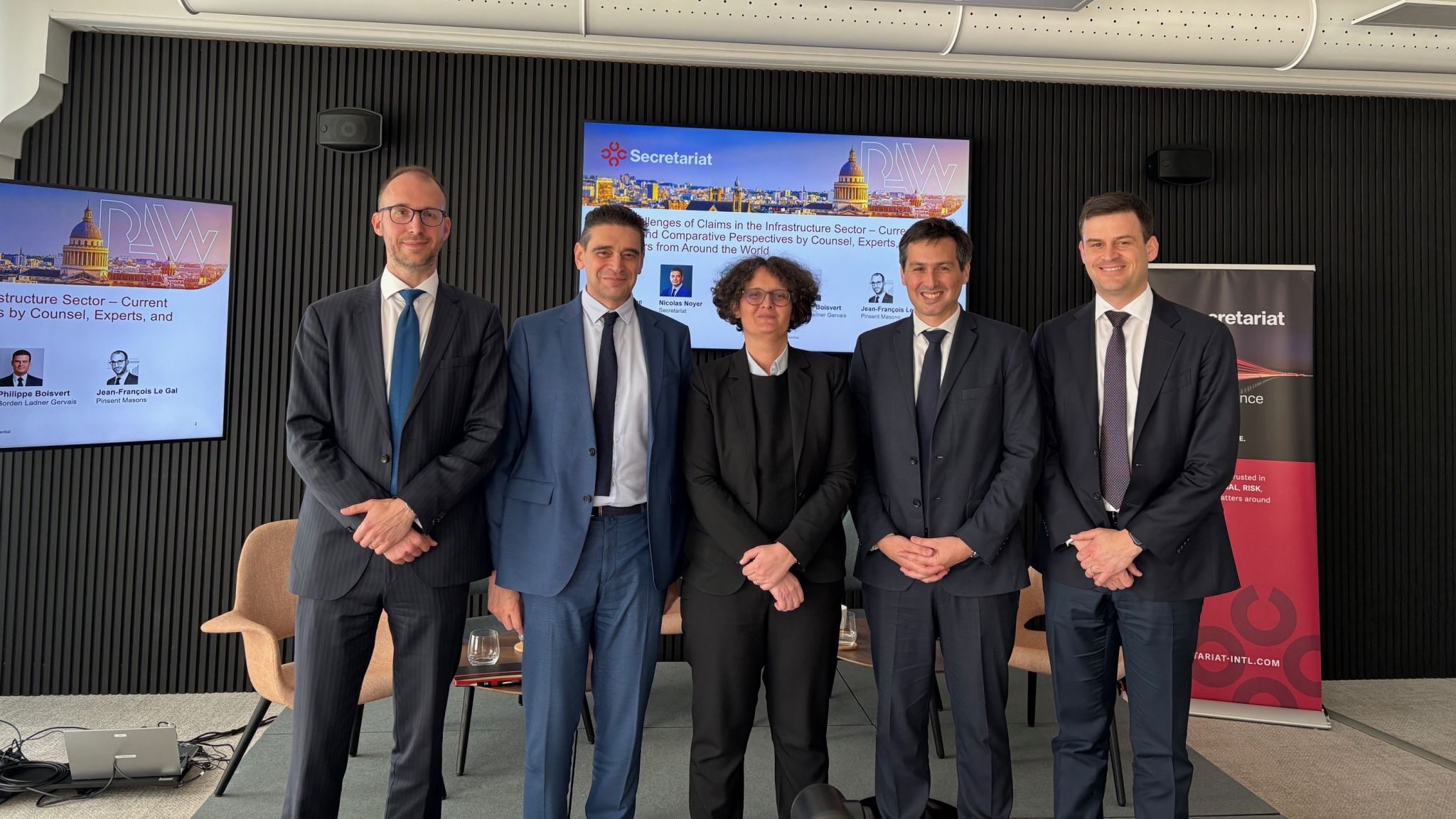
Directors Etienne Berge and Nicolas Noyer commenced Secretariat’s PAW participation, speaking on a panel titled “The Challenges of Claims in the Infrastructure Sector — Current Trends and Comparative Perspectives by Counsel, Experts and Arbitrators from Around the World.”
The Secretariat-hosted panel featured prominent arbitrators, lawyers, and quantum and delay experts from Asia, North America, and the UK. Drawing on their unique experience of working with clients across various industries and continents, Etienne and Nicolas joined panelists Elodie Dulac (King & Spalding), Philippe Boisvert (Borden Ladner Gervais LLP), and Jean-François Le Gal (Pinsent Masons) in discussing emerging and existing trends in construction claims. The experts provided insights into how construction claims are dealt with in their different geographies, comparing:
- The practical approach of the parties in the management of construction claims, from initiation to the resolution of formal disputes
- The influence of the law systems in place
- The evolution of typical construction contracts
- The role of lawyers and experts
We were grateful to share valuable perspectives, learn from the diverse experience of our esteemed colleagues, and discuss innovative ways to navigate emerging and ongoing challenges in construction claims.
Tuesday, April 8
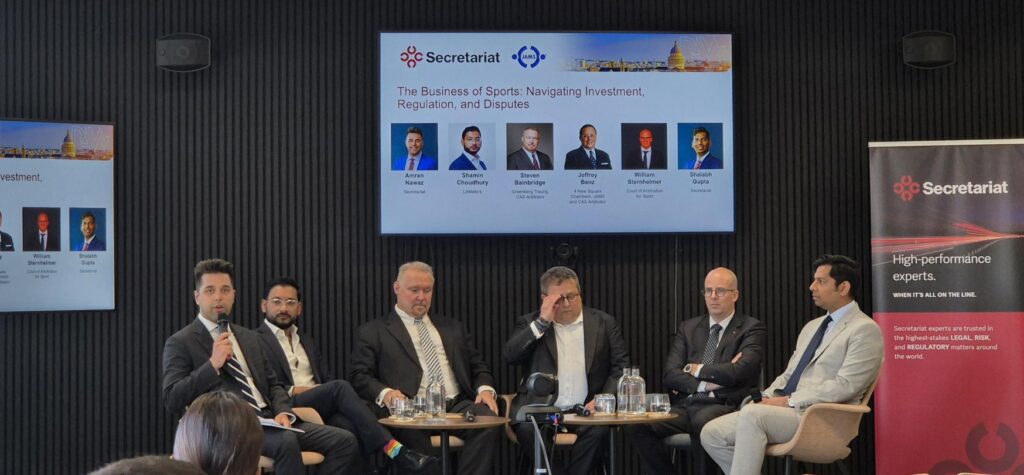
Associate Directors Shalabh Gupta and Amran Nawaz analyzed the intersection of law, finance, and sports during the “The Business of Sports: Navigating Investment, Regulation, and Disputes” panel discussion.
This panel, also hosted by Secretariat, brought together leading arbitrators, lawyers, and financial experts to examine the evolving landscape of business and disputes across professional sports. Drawing on their experience working with clients across various sports, industries, and continents, the panelists provided insights into the intricate financial, commercial, and regulatory matters shaping professional sports.
We enjoyed comparing commercial and sports arbitration and exploring how dispute resolution in sports can learn from challenges faced in other industries. Thank you to our fellow panelists — Steven Bainbridge (Greenberg Traurig), Jeffrey Benz (4 New Square Chambers), Shamin Choudhury (Linklaters), and William Sternheimer (Court of Arbitration for Sport).
Thursday, April 10
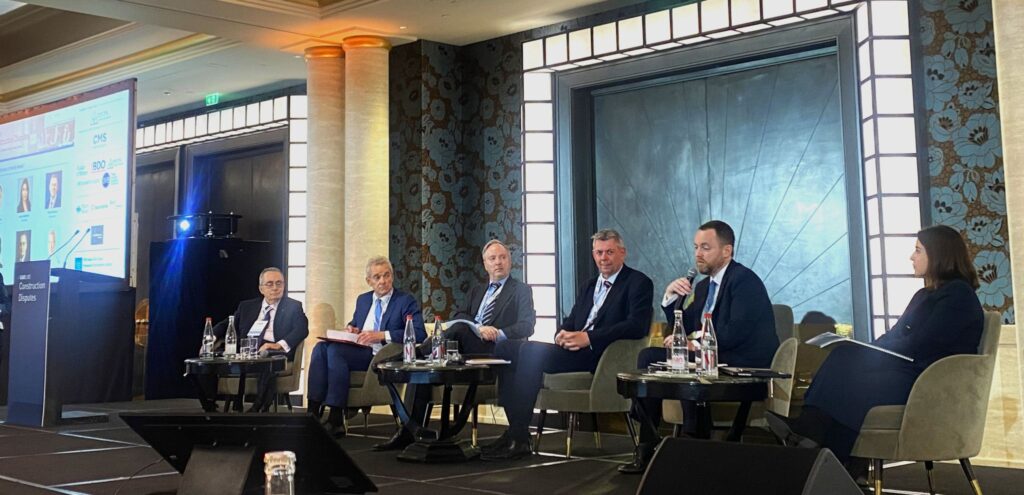
On Thursday afternoon, Managing Director Oliver Barnes participated in the Global Arbitration Review (GAR) Live: Construction Disputes panel “Family Fortunes or Family Feuds?”
Oliver joined Aarta Alkarimi (Chrysalis), Liam Hart (Reed Smith LLP), Douglas Jones (independent arbitrator), Peter Rosher (Reed Smith LLP), and David Thomas (Keating Chambers) to discuss the pros and cons of disputes involving NEC contracts and examine if and how NEC contracts may deliver fewer disputes, greater cost clarity, and improved collaboration.

On Thursday evening, we attended the 15th Annual GAR Awards. During the event, Secretariat was named as the #1 Expert Witness Firm in the Global Arbitration Review (GAR) 100 Expert Witness Firms’ Power Index 2025, earning the top-ranking spot for the second consecutive year.
The Secretariat team attending the event included Mike Saulsbury, Eric Guyer, Alexandre Riviere, John Little, Natasha Willicombe, Howard Rosen, Nick Child, Travis Taylor, Shane Kennett, Björn Brand, and Oliver Barnes.
This award reflects our experts’ steadfast commitment to providing objective insights, impactful testimony, and exceptional client service in the most complex, high-value arbitrations.
Managing Director Charlie Warren explores the impact of consumer boycotts on M&A in Southeast Asia in Deal Street Asia’s latest article, Beyond the Buyout.
“There are already heightened ESG, sanctions and integrity risks all across the supply chain particularly in Southeast Asia”, comments Charlie. “There is also the need to assess historical and ongoing consumer sentiment towards brands, how the businesses have addressed previous complaints and grievances, and to measure how well prepared the business is to respond.”
- Gen AI has emerged as a dominant force, reshaping legal practices and workflows.
- 80% of legal professionals now rate themselves as knowledgeable about AI, reflecting growing confidence in the technology.
- 74% of respondents expect to use AI-driven tools in their jobs within the next 12 months, underscoring AI’s critical role in the future of legal work.
The 2025 Artificial Intelligence Report, conducted by Secretariat in collaboration with ACEDS, has revealed groundbreaking insights into the rapidly evolving role of artificial intelligence (AI) in the legal industry. With a focus on Generative AI (GenAI) and its increasing integration into legal workflows, the survey provides essential data for organizations navigating the future of legal practice and technology. Now in its third year, the report’s research and analysis was once again led by legal AI expert Richard Finkelman in collaboration with ACEDS. This year also marks the first partnership with Secretariat to sponsor this comprehensive study.
The report shares insights into key areas of AI use in legal practice, including:
- Gen AI: recent usage, tools, applications, and predictions for its biggest impact in the next 12 months.
- AI Experience: investment plans, organizational strategies, barriers, and expected AI usage in the next year.
- ESI Agreements: involvement in Electronically Stored Information (ESI) agreements with technology-assisted review (TAR), especially for privilege review, and challenges in negotiating these agreements.
- AI in Document Review: effectiveness in document and privilege review, cost-saving potential, and tools used.
“Our report clearly shows we have reached a watershed moment in legal’s AI adoption. It is no longer a passing trend but a transformative force that is fundamentally changing how legal professionals work.” said Richard Finkelman, Managing Director at Secretariat. “Our survey reveals that legal organizations are not just adopting AI—they’re planning for it to become a core part of their operations in the very near future. With 74% of respondents expecting to use AI tools within a year, the time for strategic planning, investment, and adoption is now.”
“This year’s findings clearly show that legal professionals are no longer just exploring AI—they’re actively preparing to embed it into their daily work,” said Maribel Rivera, VP of Strategy and Client Engagement at ACEDS. “At ACEDS, we’re seeing this shift firsthand as professionals seek out training and tools to confidently navigate this next era of legal tech. The momentum is real, and it’s exciting to see the industry embrace both the opportunities and the responsibility that come with AI adoption
The 2025 Secretariat and ACEDS AI Report surveyed professionals across the legal industry globally, with 40% of respondents representing eDiscovery/legal support professionals and 22% attorneys. A significant portion of the responses came from law firms, accounting for 49% of total respondents. The data reflects a diverse range of organizations, with 56% of respondents from companies with more than 250 employees.
Despite the widespread optimism about AI’s potential, the survey also highlights barriers to adoption, including data privacy concerns, cost, and AI hallucinations, which continue to challenge many organizations.
The 2025 Secretariat and ACEDS Artificial Intelligence Report provides valuable insights for legal professionals and organizations looking to stay ahead of AI trends and tackle the challenges of AI adoption head-on. To download a copy of the report, click here.
Secretariat and ACEDS 2025 Artificial Intelligence Report
We’re excited to announce the launch of our latest Artificial Intelligence (AI) global report in collaboration with ACEDS, providing a critical snapshot of industry sentiment, adoption trends, and the evolving role of AI in legal practice.
About Secretariat — Secretariat experts are trusted in the highest-stakes legal, risk, and regulatory matters around the world. Renowned law firms, leading corporations, and respected governmental entities turn to our more than 600 disputes, investigations, economic, engineering, and data advisory experts when the stakes are high— supporting them with meticulous preparation, insightful analysis, and clearly persuasive communications. Our bright minds and passionate problem-solvers put their financial, analytical, and strategic insights to work in the fast-paced sectors we serve – from construction and energy to healthcare, technology, and natural resources. Quality, integrity, and independence are woven into every aspect of our work. But, most importantly, when success is on the line, our globally integrated teams thrive on working through the most daunting problems in ways that remove uncertainty and instill confidence.
Secretariat Media Contact
Nathan Jenks T:+1 773 220 8896 E:njenks@secretariat-intl.com
About ACEDS — The Association of Certified E-Discovery Specialists (ACEDS), part of leading legal education provider BARBRI Global, is the world’s leading organization for training and certification in e-discovery, information governance, and related disciplines. ACEDS provides training to corporate legal departments, law firms, the government, service providers, and institutions of higher learning. Our flagship CEDS certification is recognized worldwide and used to verify skills and competence in electronic discovery for organizations and individuals through training, certification, and continuing education. The CEDS credential is held by practitioners at the largest Fortune 500 companies, Am Law 200 firms and government agencies. ACEDS has 30 chapters in most major US cities, Canada, the UK, Ireland, the Netherlands, South Africa, and Australia. Our goal is to help professionals and organizations reduce the costs and risks associated with e-discovery while helping to improve and verify their skills and advance their careers and overall technology competence in e-discovery and related fields. Learn more at www.aceds.org.
ACEDS Media Contact
Katie Saylor T: 913.219.4444 E:ksaylor@aceds.org
About BARBRI — BARBRI is the global leader in technology-enabled legal education with leadership positions in the US and the UK. Dedicated to providing unparalleled innovation and excellence in legal education, BARBRI delivers outstanding success to learners by providing the most trusted and industry leading products under one unified experience and across every step of the legal learner’s path. Building on the success of its core bar courses, which have helped more than 1.5 million lawyers around the world pass a U.S. bar exam, BARBRI offers a comprehensive suite of learning solutions for higher education institutions and law-related businesses empowering every step of legal learning journey. Founded in 1967, BARBRI is headquartered in Dallas, Texas, with offices throughout the United States and around the world.
We’re excited to announce the launch of our latest Artificial Intelligence (AI) global report in collaboration with ACEDS, providing a critical snapshot of industry sentiment, adoption trends, and the evolving role of AI in legal practice.
AI is rapidly reshaping legal practice, with Generative AI (GenAI) now a dominant force in the industry. The Secretariat and ACEDS 2025 Artificial Intelligence Report, now in its third year, highlights the latest trends in AI adoption, industry sentiment, and the challenges professionals face in integrating AI into their legal practice and workflows.
This year’s results reflect significant shifts, including:
- GenAI has arrived as a dominant force in legal technology
- A growing industry-wide confidence in AI comprehension, with 80% of respondents now rating themselves as knowledgeable
- AI-driven tools will be integral to legal work, with 74% expecting to use them thisyear
- The establishment of human-AI collaboration, with hybrid document reviews expected to become the new normal
- Key barriers to adoption remain, including attorney education, data privacy concerns, cost, and AI hallucinations
As AI continues to evolve rapidly, organizations must make critical decisions on adoption, strategy, and implementation. Our global report provides key insights to help you navigate these changes swiftly and effectively.
Reach out to Richard Finkelman if you would like to discuss any of the issues raised in this report or if you would be interested in joining our Working Group: Code & Counsel: Women in Legal & AI.
The new initiative will provide practical guidance for the use of AI in the legal industry and will promote ethical use and diversity.
The Association of Certified E-Discovery Specialists (ACEDS), the world’s leading organization for e-discovery training and certification, has announced the formation of its first working group, “Code & Counsel: Women in Legal & AI.” This new initiative, developed in partnership with the expert and forensic advisory firm Secretariat, seeks to bridge the gender gap in AI adoption within the legal profession. Collectively the working group will explore ethical and innovative applications of AI across legal technology—including e-discovery—advance inclusive practices, and provide legal professionals with practical tools to integrate AI into their daily work.
The working group held its inaugural meeting earlier this month and will convene regularly to advance these objectives.
The Code & Counsel working group brings together accomplished women lawyers and legal professionals with expertise in digital evidence, e-discovery and legal data intelligence, including:
- Kassi Burns, Senior Attorney at King & Spalding and AI podcaster
- Fiona Campbell, Director, Dispute Resolution, Head of Electronic Disclosure at Fieldfisher
- Martha K. Louks, Director of Technology Services at McDermott Will & Emery
- Angela O’Neal, Director at Nextra Solutions
- Ashley Picker Dubin, Counsel at Day Pitney
- Jennifer Williams, Senior Director, eDiscovery, Litigation Support & Office Services at Vinson & Elkins
Additional members will be announced in the coming months.
“We are excited to launch this important working group,” said Maribel Rivera, VP at ACEDS “By bringing together these women who are engaged in AI, we aim to foster a collaborative environment where they can share knowledge, develop practical and ethical AI solutions, and inspire greater participation of women in legal technology.”
A recent National Law Review article highlighted a stark gender disparity in generative AI (GenAI) adoption: 64% of male lawyers use GenAI, compared to only 40% of female lawyers.
“This gap is concerning, especially since women make up a significant portion of legal professionals, including 75% of legal aid attorneys.” Rivera continued. “This working group is committed to tackling the challenges and opportunities presented by AI in legal practice. We’re not just educating the market on AI’s transformative potential—we’re also championing greater sense of inclusion while ensuring AI’s ethical development and deployment.”
With an increase among women graduating from law school, it is critical as they enter the legal profession that they gain proficiency in AI-powered legal technologies to advance their careers and contribute to a more equitable and accessible legal system.
“We are delighted to support ACEDS and this working group of accomplished women who are leading several AI initiatives in their firms and in the industry. Secretariat will be supporting this group by providing resources and technology to the working group so they can evaluate AI tools and develop recommendations for others who need assistance with AI adoption,” said Richard Finkelman, Managing Director at Secretariat
To support AI adoption and responsible implementation, Code & Counsel will develop practical resources and guidance for law firms, corporations, and legal service providers, including:
- Best Practices & Guidelines – Actionable insights for implementing AI in legal workflows while ensuring responsible use and risk mitigation.
- Educational Materials – White papers, webinars, and training sessions to inform legal professionals about AI’s capabilities and limitations.
- Tool Evaluations – A curated list of vetted AI tools and resources for legal organizations.
The formation of Code & Counsel builds upon ACEDS’ recent partnership with Secretariat to advance AI education and adoption within the legal community. The working group will actively engage the broader legal industry through publications, presentations, and workshops to share insights and promote best practices.
For more information about the working group or to get involved, contact Maribel Rivera at ACEDS.
About Secretariat
Secretariat experts are trusted in the highest-stakes legal, risk, and regulatory matters around the world. Renowned law firms, leading corporations, and respected governmental entities turn to our more than 600 disputes, investigations, economic, engineering, and data advisory experts when the stakes are high— supporting them with meticulous preparation, insightful analysis, and clearly persuasive communications.
Our bright minds and passionate problem-solvers put their financial, analytical, and strategic insights to work in the fast-paced sectors we serve – from construction and energy to healthcare, technology, and natural resources.
Quality, integrity, and independence are woven into every aspect of our work. But, most importantly, when success is on the line, our globally integrated teams thrive on working through the most daunting problems in ways that remove uncertainty and instill confidence. Learn more at www.secretariat-intl.com.
About ACEDS
The Association of Certified E-Discovery Specialists (ACEDS), part of leading legal education provider BARBRI Global, is the world’s leading organization for training and certification in e-discovery, information governance, and related disciplines. ACEDS provides training to corporate legal departments, law firms, the government, service providers, and institutions of higher learning. Our flagship CEDS certification is recognized worldwide and used to verify skills and competence in electronic discovery for organizations and individuals through training, certification, and continuing education. The CEDS credential is held by practitioners at the largest Fortune 500 companies, Am Law 200 firms and government agencies. ACEDS has 30 chapters in most major US cities, Canada, the UK, Ireland, the Netherlands, South Africa, and Australia. Our goal is to help professionals and organizations reduce the costs and risks associated with e-discovery while helping to improve and verify their skills and advance their careers and overall technology competence in e-discovery and related fields.
About BARBRI
BARBRI is the global leader in technology-enabled legal education with leadership positions in the US and the UK. Dedicated to providing unparalleled innovation and excellence in legal education, BARBRI delivers outstanding success to learners by providing the most trusted and industry leading products under one unified experience and across every step of the legal learner’s path. Building on the success of its core bar courses, which have helped more than 1.5 million lawyers around the world pass a U.S. bar exam, BARBRI offers a comprehensive suite of learning solutions for higher education institutions and law-related businesses empowering every step of legal learning journey. Founded in 1967, BARBRI is headquartered in Dallas, Texas, with offices throughout the United States and around the world.
Shalabh Gupta, Amran Nawaz, and Daniel Nazareth joined the 2 Guys, A Girl, and F1 podcast to discuss their article “Demystifying Andretti’s Failed F1 Application” and share valuable insights on the F1 business landscape, Andretti’s application, and anti-dilution fees. The experts also discuss the motivations behind GM Cadillac’s successful F1 application and its broader impacts on the sport.
Why was GM Cadillac’s application accepted over Andretti’s, and how might this decision affect existing teams and the overall dynamics of the sport? With F1’s increasing popularity, understanding these considerations is more important than ever.
Listen to Shalabh, Amran, and Daniel on the 2 Guys, A Girl, and F1 podcast here.
Read: Demystifying Andretti’s Failed F1 Application
by Shalabh Gupta, Amran Nawaz, and Chris Kavanagh
Introduction
The popularity and value of sports leagues and teams have grown exponentially in recent decades, and athletes’ earnings have reached unprecedented heights. For example, wage costs in European football leagues have increased by 10x (in France) to 14x (in England) over the past three decades.[1]
Figure 1: “Chart 4: ‘Big Five’ European League clubs’ wage costs – 1996/97 and 2013/14 to 2022/23 (€m)”1
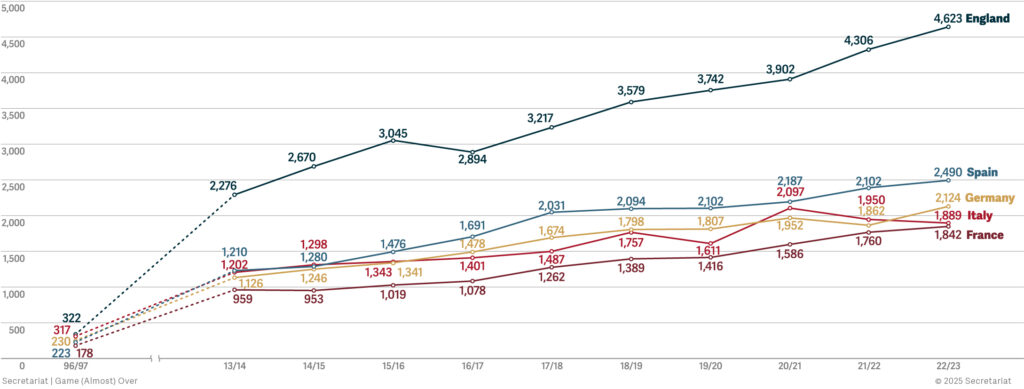
This surge in earnings has led to an increase in litigation and arbitration when athletes face career-impacting or career-ending events.
In recent news, the Court of Justice of the European Union (CJEU) ruled that specific provisions of the FIFA regulations violated EU law. The ruling was based on a case in 2014 when Lokomotiv Moscow brought a claim against Lassana Diarra (a former footballer) for his alleged unjust contract termination. Diarra’s career was halted pending the initial ruling, derailing his career. The ruling will have ramifications for players, clubs, and the entire football transfer system.[2]
This article dives into the ever-growing area of personal injury damages in sports and the economic theory behind it. We discuss current and historical cases from the United Kingdom, United States, Canada and the Court of Arbitration for Sport, their applicable judgements, and how a damages expert’s evidence (or lack thereof) can impact the monetary damages an athlete may be awarded.
The Fundamentals of Economic Losses
Economic losses impacting individuals can arise in several situations, including personal injury, wrongful termination, and breach of contract.
A trier of fact may award monetary and/or non-monetary awards when an economic loss event occurs. Damages experts with experience in finance, accounting, economics, valuation and the quantification of economic damages are generally involved in the quantification of monetary damages,[3] which typically consist of one of the following:
- Compensatory (or Special) Damages – damages that aim to restore the plaintiff to the same position they would have occupied had the event(s) that caused economic losses to the plaintiff not occurred.
- Restitution (or Disgorgement) Damages – damages that aim to make a defendant give up profits or benefits it earned through wrongful means.
In personal injury matters, monetary damages typically consist of income losses, which are calculated as the income that the individual would have earned over their work-life expectancy, absent or ‘but-for’ the incident that caused the injury, less the income that the individual earned since the incident and is expected to earn in the future, as illustrated in the graphic below. Income losses are divided into two time periods: past losses occur from the date of the injury to the date of the trial/award, and future losses are the losses which are expected to occur from the date of the trial/award to the date the individual is expected to retire.
Figure 2: Illustrative Example of Economic Loss

Thus, the key elements that must be determined in the calculation of past and future income losses are:
- The individual’s estimated earnings absent the injury from the date of the injury over their estimated remaining work-life expectancy. The relevant factors are case-specific and will typically consider the individual’s age, life expectancy, work experience, historical earnings, expected career trajectory, employment contracts, retirement age, and economic conditions. This analysis would include an assessment of contemporaneous contracts, agreements, and other relevant documents available prior to the injury, as well as an assessment of comparable competitors or athletes.
- The individual’s actual earnings from the date of the injury to the date of the assessment and their estimated actual earnings thereafter over their remaining work life expectancy given their injury. The relevant factors are the same as above but will also include assumptions, typically based on expert medical or vocational opinions, concerning the individual’s prognosis for recovery and their ability to obtain alternative employment to mitigate their losses.
A claim for economic losses must adequately assess and reflect the above considerations relevant to the case to assist the trier of fact in their determination.
Claims for Economic Losses in Sports
We have identified several examples of substantiated and unsubstantiated claims for economic losses in sports-related disputes. Unsurprisingly, the unsubstantiated claims were not awarded a favourable result for the plaintiff.
For example:
- Dr. Dorofeyeva (a sports medicine specialist) was ruled to be ineligible to practice for a period of four years for violating the International Tennis Federation’s (ITF) anti-doping policy by advising a professional tennis player to take a product which contained a banned substance. In Dr. Dorofeyeva’s appeal, she sought compensatory damages of €150,000 and punitive damages of €250,000. The arbitrator found “…that the claims submitted by [Dr. Dorofeyeva] are completely unsubstantiated… [Dr. Dorofeyeva] neither submitted any evidence nor a skeleton calculation how she derived the figures claimed. Already for these reasons the claims must be dismissed.”[4]
- A sports agent lodged a claim against Bologna FC for not making an agreed-upon bonus payment of €4,000,000 upon the successful transfer of a soccer player. Mr. Pineiro requested payment of the bonus and an unspecified amount of monetary damages. The tribunal ultimately found that the club was liable to pay €2,000,000, plus interest. However, “…the Agent’s request for ‘monetary damages’ was not supported by convincing evidence, and therefore, such request should be dismissed.”[5]
- A court justice was unable to use the evidence of an expert witness in quantifying the losses to an eighteen-year-old playing for Manchester United Football Club, as he found the expert’s opinion to be “somewhat anecdotal and subjective in nature”. The justice also found the tone of the expert’s evidence to be unmeasured in their criticisms of other evidence.[6]
Conversely, when claims for economic losses are adequately substantiated, the awards can be significant. In a medical malpractice claim brought against a defendant relating to the treatment of a knee injury, which ended Mr. Maragos’ career, the plaintiff’s economic losses were assessed at $9 million, “…evidenced by his contract at the time of his injury as well as a reasonable projection for a future contract had he continued to play.”[7],[8]
Case Study – A Deep Dive into an Athlete’s Personal Injury Losses
The case of Michael Appleton v. Medhat Mohammed El Safty provides a comprehensive example of how courts assess the economic losses of an athlete. Mr. Appleton, a professional European football player, sustained a partial tear in his right knee, which led to the defendant advising Mr. Appleton to have reconstructive surgery, which the defendant then negligently carried out. Mr. Appleton sought £7 million in losses.[9]
Justice Clarke provided a detailed assessment of the damages suffered by Mr. Appleton based on the joint report provided by both parties’ experts. The table below highlights some key considerations and how they impacted Justice Clarke’s decisions.
Appleton v. El Safty (EWHC 631(QB))
| Consideration | Claimant’s Expert | Defendant’s Expert | Justice Clarke’s Decision | Justice Clarke’s Reasoning |
| Estimating future playing time after expiry of the current contract[10] | Either 1) Mr. Appleton would remain with West Bromwich Albion FC, or 2) Mr. Appleton would have moved to another established club in the Premier League. | Mr. Appleton would not have continued at the same level for more than three years. | Accepted Defendant’s Expert’s Position. | There was not “any real or substantial chance of the claimant transferring to another Premiership club at that stage given his history and prognosis.” |
| Sign-on fee and salary under another premiership club scenario[11] | A signing fee of £100,000 per year and a £500,000 salary increasing by £50,000 each year. | £450,000, increasing by £50,000 each year, would be appropriate. | Preferred the Claimant Expert’s position. | It was unclear whether the Defendant’s expert’s estimate included a signing fee. Further, there were inconsistencies among the Defendant’s expert’s oral evidence, cross-examination and re-examination. |
| Estimated appearances[12] | No details given in the Claimant Expert’s opinion. | Estimated at 70%, declining to 60% over the next three seasons. | Independent decision of 85%. | Found the Defendant’s position too pessimistic and based decision on Mr. Appleton’s appearance history from the prior season. |
| Personal bonus[13] | Personal bonus of up to £3,000 per match based on a similar agreement for another player. | No details given in the Defendant Expert’s opinion. | Independent decision that Claimant would not receive a personal bonus. | Based on evidence that, West Bromwich Albion FC only awarded personal bonuses to lower-paid players, which Mr. Appleton was not. |
| Career progression post-retirement[14] | Mr. Appleton would become a manager in the premiership after retirement at age 31. | No details given in the Defendant Expert’s opinion. | Independent decision to award a lump sum of £60,000. | Opined that the Claimant’s chances were very low, citing that there are only 92 managerial jobs in the professional leagues, with low vacancies and fierce competition, and Mr. Appleton would have been young and inexperienced. |
Conclusion
Successfully claiming economic losses in sports requires a comprehensive assessment of an athlete’s financial and career trajectory. Given the multiple income sources, fluctuating earnings, and the complexities of projecting income in the absence of an injury, a detailed and robust quantification is critical. The cases of Mr. Appleton and Mr. Maragos highlight that well-substantiated expert reports, incorporating all relevant economic factors, can assist in supporting the quantum of losses claimed. By applying rigorous and transparent methodologies, damages experts not only support fair compensation but also enhance the credibility and reliability of financial claims in legal proceedings.
About the Authors
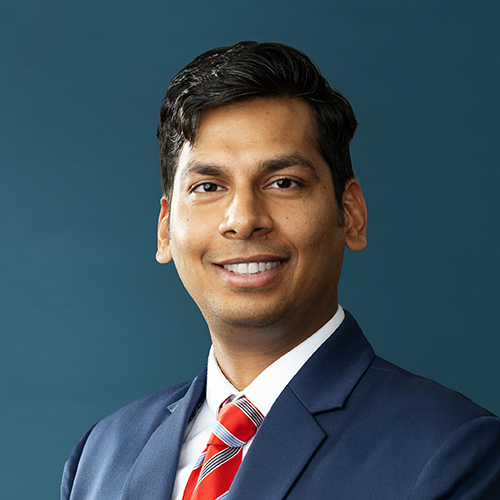
Shalabh Gupta
Associate Director | Toronto
Shalabh has provided financial analyses, economic advisory, forensic accounting, quantification of damages and other litigation support services to clients and their counsel for 10 years. He is a Chartered Accountant (CA), a Certified Fraud Examiner (CFE), and a Chartered Business Valuator (CBV).
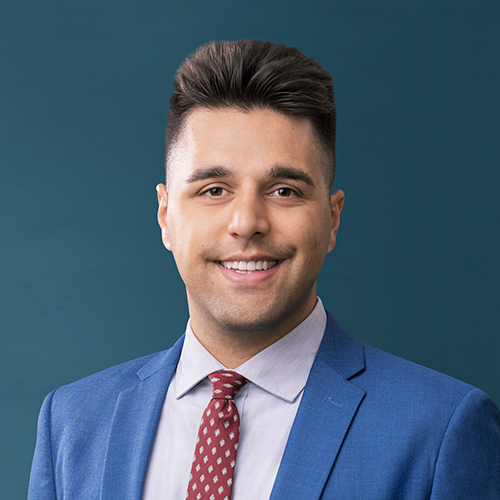
Amran Nawaz
Manager | Toronto
Amran has more than 8 years of experience in accounting and financial consulting, with specializations in the quantification of damages and valuations in the context of commercial and investment disputes. He is a Chartered Professional Accountant (CPA, CA) and a Chartered Business Valuator (CBV).
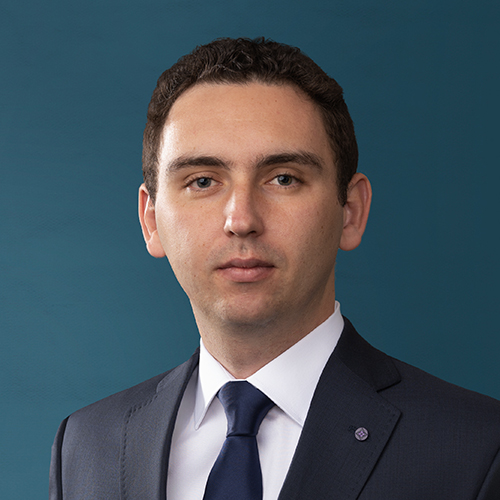
Chris Kavanagh
Senior Associate | Toronto
Chris has over 4 years of experience in damage quantification, financial analysis, litigation support and business valuation services. He is a Chartered Professional Accountant (CPA) and a Chartered Business Valuator (CBV).
[1] Deloitte Annual Review of Football Finance 2024. Wage costs. Wage costs include wages, salaries, signing-on fees, bonuses, termination payments, social security contributions and other employee benefit expenses.
[2] Diarra vs FIFA’s RSTP – Bosman 2.0?, Morgan Sports Law.
[3] Damages experts are not typically involved in non-monetary awards, as they relate to matters at the judge’s discretion, such as pain and suffering.
[4] Dorofeyeva v. International Tennis Federation, (CAS 2016/A/4697), Paragraph 94.
[5] Bologna FC 1909 S.p.A. v. Gonzalo Luis Madrid Pineiro (CAS 2016/A/4517), Paragraphs 12, 14 and 70.
[6] Benjamin Collett v. Gary Smith (EWHC 1962 (QB)), Paragraph 89.
[7] Maragos v. Bradley, Non-precedential decision (S.C. Pennsylvania 2023), Page 11.
[8] Mr. Maragos further received “approximately $36 million for noneconomic damages such as pain and suffering”, bringing his total claim to $43.5 million. Source: Law360 article, “Pa. Court Affirms Ex-Eagle’s $43.5M Knee Injury Verdict”, August 2024.
[9] Appleton v. El Safty (EWHC 631(QB)), Paragraphs 1-2.
[10] Ibid, paragraphs 106 – 109.
[11] Ibid, Paragraphs 122 – 127.
[12] Ibid, paragraphs 112 – 114.
[13] Ibid, paragraphs 117 – 118.
[14] Ibid, paragraph 167 – 172.
Secretariat, the leading disputes, investigations, economics, engineering, and data advisory firm, is thrilled to announce the promotion of 64 individuals effective as of January 1, 2025.
“These well-earned promotions underscore Secretariat’s continued growth and expansion across geographical regions and service lines,” said CEO Don Harvey. “As a firm, we are dedicated to supporting our exceptional professionals, continuing to cultivate unparalleled talent, and further strengthening our global expertise.”
We are proud to highlight these promotions, which exemplify the wealth of experience offered by our global professionals and span across 18 offices: Atlanta, Boston, Brisbane, Chicago, Dallas, Denver, Dubai, Hong Kong, Houston, London, Los Angeles, Mumbai, Munich, New York, San Diego, San Francisco, Toronto, and Washington, DC.
Congratulations to our newest:
Managers
- Arham Chohan
- Marshall Deng
- Varun Dhawan
- Frances Escalona
- Moti Jiang
- Paul Kelly
- Jacob Miller
- Lawrence Myung
- Madison Ondo
- Lauren Shannon
- Nate Tolles
- Manuel Trevino
- Tobin Van Bremen
- Kenneth Yau
- Zaima Zeniya
Senior Associates
- Matt Badali
- Enobong Bassey
- Sarab Bhatia
- Noah Case
- Pranick Chamlagai
- Charlotte Drake-Dun
- Zuura Dzhuzumkulova
- Ananya Jain
- Luyang Jia
- Matt Joesoep
- Chris Kavanagh
- Lucas Keeton
- Meghan Ourand
- Christine Pang
- Aabha Parikh
- Elizabeth Parker
- Mark Roberts
- Wyatt Rose
- Oliver Saffery
- Billy Si
- Justin Wang
- Terence Yim
Corporate Professionals
- Kayla Brown (Senior Specialist)
- Vonetta Johnson (Manager)
- Jillian Rathbone (Operations Manager)
- Patti Nelson (Senior Manager)
- Sean Sebers (Analyst)
- Kyle Smith (Senior Manager)
Managing Director Ralph Stobwasser discusses with Gulf State Newsletter (GSN) the latest findings from Secretariat’s white paper, Integrity and Accountability: Saudi Arabia’s Anti-Corruption Drive. Sharing key data insights from the white paper, GSN discusses the recent increase in anti-corruption investigations and arrests by Nazaha, Saudi Arabia’s Oversight and Anti-Corruption Authority.
Read GSN’s coverage here (subscription required).
Managing Director Chaitanya Arora provided an expert report and testimony in a complex trust dispute litigation case brought before the High Court of Singapore. Mr. Arora’s testimony was upheld and accepted on all counts.
Mr. Arora was retained by TSMP Law Corporation on behalf of three family members as plaintiffs to provide expert testimony and quantify damages in a case against the plaintiffs’ father.
The plaintiffs alleged that the defendant, in the role of trustee, acted in breach of a testamentary trust created under the Last Will and Testament of their late paternal grandfather. The will outlined the assets for the defendant to hold on trust for the named beneficiaries, the plaintiffs. The trust’s assets included real property as well as hundreds of thousands of shares in several private companies co-founded by the plaintiffs’ grandfather. Mr. Arora assessed damages to the trust and quantified the capital that ought to have been returned to the Trust. Notably, Mr. Arora’s testimony informed the Court’s decision on the difference in value of a founder’s share with special rights, when compared to an ordinary share.
The Honorable Justice Goh Yihan, Judge of the High Court, accepted Mr. Arora’s testimony and valuations of the disputed trust assets over the defendant’s presented expert. Justice Goh found in favor of the plaintiffs, awarding substantial damages based on the analysis and calculations provided by Mr. Arora for the various claims.
“The case is interesting from several perspectives,” Mr. Arora said. “The judgment highlights the points of law regarding a trustee’s’ fiduciary duties even when the trustee has absolute discretion. It also underscores the importance of instructions to experts and the need for experts to ‘stick to their lane’, as a significant part of the opposing expert’s testimony was dismissed by Justice Goh for opining on issues that is not within his professed expertise.”
Read the judgment in full here.
Secretariat is proud to be sponsoring the ACEDS Third Annual Artificial Intelligence Survey. This represents a unique opportunity to assess the state of AI adoption in the legal industry and identify both opportunities and obstacles for the road ahead. With each passing year, this survey has provided invaluable guidance for legal professionals navigating a rapidly evolving technological landscape.
We invite you to reflect on your own experiences. What changes have you observed in the use of AI in e-discovery and document review? Have you used GenAI for your work and how do you think GenAI will shape the future of our industry? Join the conversation and to share your thoughts as we uncover the latest insights.
2025 Artificial Intelligence (AI) Survey
Help Shape the Future of Legal AI — Take the 3rd Annual AI Survey
In this survey we will be examining the role of AI in e-discovery, document review, and investigations, including the growing impact of Generative AI (GenAI). Previous surveys have provided meaningful insights into AI adoption, and we look forward to discovering what new trends come out of this year’s findings.
What Will the 2025 Survey Uncover?
With these historical insights in mind, the forthcoming 2025 survey promises to shed light on new and evolving trends in AI’s role in e-discovery, document review and investigations, including:
- How is GenAI Reshaping eDiscovery and document review? How quickly is GenAI being adopted for legal work? What are the most commonly used applications? Will GenAI’s ability to predict document characteristics be adopted for responsive and privileged document review? How will concerns over AI hallucinations be addressed?
- What Role Does AI Play in Investigations? AI has become a powerful tool for uncovering critical evidence in investigations, enabling faster review and identification of key patterns within vast datasets. How are law firms and investigators leveraging AI to enhance their work, and what challenges are they encountering along the way?
- Are ESI Agreements Improving? Have the issues identified in previous surveys around poorly drafted ESI agreements been addressed, or do they persist as a common pain point? If progress has been made, what best practices are driving this improvement?
- Are Corporations Closing the AI Gap? Will this year’s survey reveal that corporate legal departments have made strides in adopting AI tools, narrowing the gap with law firms? What strategies have proven most effective in helping corporations embrace AI, and where do challenges remain?
Previous surveys uncovered unexpected issues and insights including:
Trends from Previous Surveys

ESI Agreements Causing Downstream Issues
A troubling pattern of poorly constructed Electronically Stored Information (ESI) agreements came out in both the 2023 and 2024 surveys. These agreements have often led to significant downstream issues, including not foreseeing future data types and by increasing costs by agreeing to restrictive document review protocols. The findings emphasized the need for more careful negotiation and drafting of ESI protocols to minimize complications and disputes later in discovery.
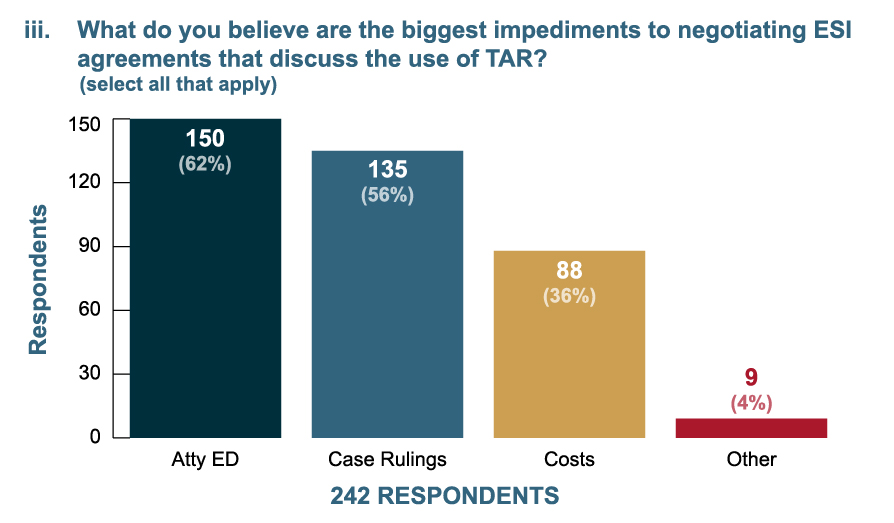
Law Firms Adopting AI Faster than Corporations
Last year’s survey found that law firms were using AI for discovery activities at much faster rates than corporations. The finding was surprising but the focus groups we conducted after completing previous surveys gave us some unique insights, including the explosion of data and new data types being generated because of the Pandemic. This gap raised important questions about how in-house legal departments could better leverage AI to streamline processes and reduce reliance on outside counsel.
2023 Report
“Over 80% of survey respondents [in 2023] said they had used AIML in document review in the last twelve months…and there was consensus that the technology worked and saved money…”
2024 Report
“Corporations are less involved in AI e-discovery activities…Law firms are overwhelmed with the amount and complexity of new data [and] they embrace AI in e-discovery…”
2025 Artificial Intelligence (AI) Survey
Help Shape the Future of Legal AI — Take the 3rd Annual AI Survey